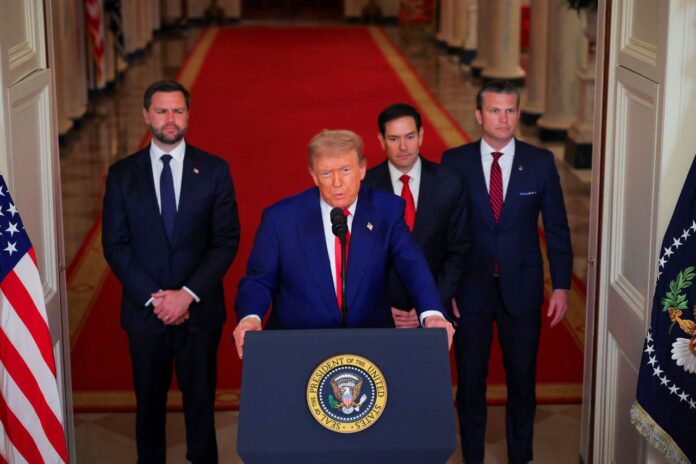U.S. Strikes Three Key Nuclear Facilities
On June 21, 2025, President Donald Trump addressed the nation to report that U.S. forces had struck three of Iran’s major nuclear sites—Fordow, Natanz, and Esfahan—in what he called a “spectacular military success.” He described the operation as carried out with advanced precision weapons, including B-2 stealth bombers dropping massive bunker-buster bombs, and he claimed all U.S. aircraft returned safely to base nbcnewyork.com theguardian.com. Trump framed the strikes as the most significant American military action inside Iran in decades and noted that allied forces in Israel had coordinated closely on targeting enriched uranium facilities.
A Stern Warning to Tehran
In the same address, Trump warned Iran that further refusal to seek peace would bring “far greater” consequences. He stated, “There will be either peace, or there will be tragedy for Iran far greater than we have witnessed over the last eight days. Remember, there are many targets left.” With that, he pressed Iran to agree to an immediate end to hostilities. Israeli Prime Minister Benjamin Netanyahu praised Trump’s decision in a video message, calling it “bold” and asserting it “will change history” by crippling Iran’s nuclear ambitions theguardian.com.
Constitutional War-Powers Debate Reignited
These strikes have reignited a long-running debate over the respective war-powers of the President and Congress. The U.S. Constitution grants Congress the authority “to declare War” while designating the President as “Commander in Chief.” Under the War Powers Resolution of 1973, the President must notify Congress within 48 hours of introducing armed forces into hostilities and must end operations within 60 days unless Congress authorizes an extension en.wikipedia.org. Over the years, Presidents have often initiated military actions—Korea, Vietnam, Desert Storm, Afghanistan, Iraq—without formal war declarations, citing national security imperatives. Now, lawmakers on Capitol Hill are divided: some argue Trump needed explicit congressional approval for such a major strike, while others contend the President retains inherent authority to act swiftly to protect American interests.
What Comes Next?
Iran has condemned the airstrikes as a “blatant act of aggression” and vowed to continue its nuclear program and defend its sovereignty. Regional allies and adversaries alike watch closely, concerned that further escalation could draw the U.S. deeper into a wider Middle East conflict. Meanwhile, back in Washington, members of Congress have called for briefings from the Pentagon and the State Department to clarify the legal basis and intended scope of the mission.
Personal Analysis
This episode underscores how social media and rapid announcements can propel military actions into the center of legal and political debates. On the one hand, the President demonstrated resolve and striking capability, signaling to adversaries that U.S. forces can hit high-value targets with precision. On the other hand, bypassing a formal congressional vote risks undermining public trust in the checks and balances that guard against open-ended wars. Ultimately, these strikes may deter further nuclear advances in Iran, but they also raise urgent questions: will Congress assert its constitutional role, and can diplomacy keep the region from slipping into a wider conflict?

